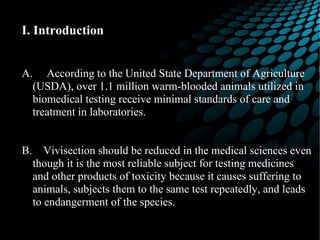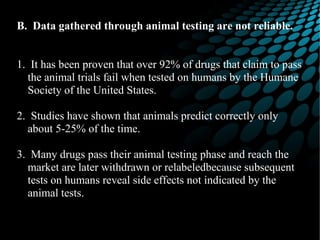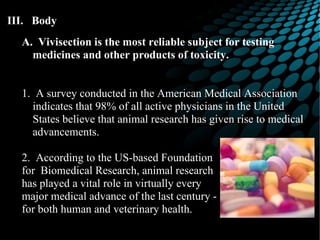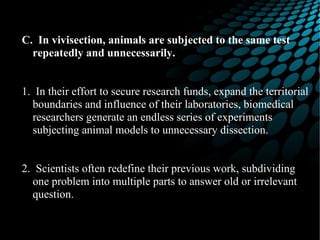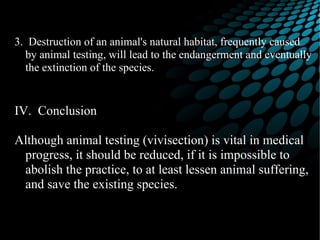Vivisection
- 1. VIVISECTION REDUCTION OF PRIMATES IN MEDICAL SCIENCES Alcalde, Loren Grace Manguilimotan, Edd Nysha
- 2. I. Introduction A. According to the United State Department of Agriculture (USDA), over 1.1 million warm-blooded animals utilized in biomedical testing receive minimal standards of care and treatment in laboratories. B. Vivisection should be reduced in the medical sciences even though it is the most reliable subject for testing medicines and other products of toxicity because it causes suffering to animals, subjects them to the same test repeatedly, and leads to endangerment of the species.
- 3. II. Background A. Animals that were non-human in nature are used as human surrogates although they may be biologically and medically irrelevant to specific problem under study. 1. In some cases, the experimental responses of an animal or a portion of its body may be so over-generalized that they no longer have any resemblance to biological reality. 2. Animal models were used to investigate infectious agents to which the animals shared vulnerability with humans. 3. Replication of research results is a valid scientific principle. Redundancy and variations on a common theme, however, are simply bad science.
- 4. B. Data gathered through animal testing are not reliable. 1. It has been proven that over 92% of drugs that claim to pass the animal trials fail when tested on humans by the Humane Society of the United States. 2. Studies have shown that animals predict correctly only about 5-25% of the time. 3. Many drugs pass their animal testing phase and reach the market are later withdrawn or relabeledbecause subsequent tests on humans reveal side effects not indicated by the animal tests.
- 5. III. Body A. Vivisection is the most reliable subject for testing medicines and other products of toxicity. 1. A survey conducted in the American Medical Association indicates that 98% of all active physicians in the United States believe that animal research has given rise to medical advancements. 2. According to the US-based Foundation for Biomedical Research, animal research has played a vital role in virtually every major medical advance of the last century - for both human and veterinary health.
- 6. 3. Human beings share over 99.4% of their genes with chimpanzees and about 99.0% with mice. For this reason, it is useful and productive to study these animals as a means of advancing human sciences.
- 7. B. Vivisection causes suffering to animals. 1. Animals have nervous systems very like ours, which respond physiologically when the animal is in circumstances in which they would feel pain: an initial rise of blood pressure, dilated pupils, perspiration, an increased pulse rate, and, if the stimulus continues, a fall in blood pressure. 2. The Guide for the Care and Use of Laboratory Animals states that "The ability to experience and respond to pain is widespread in the animal kingdom...Pain is a stressor and, if not relieved, can lead to unacceptable levels of stress and distress in animals.”
- 8. 3. Animal testing statistics compiled by People for Ethical Treatment of Animals (PETA) shows that as many 76,000 animals were subjected to testing procedures involving immense pain without administering anesthesia
- 9. C. In vivisection, animals are subjected to the same test repeatedly and unnecessarily. 1. In their effort to secure research funds, expand the territorial boundaries and influence of their laboratories, biomedical researchers generate an endless series of experiments subjecting animal models to unnecessary dissection. 2. Scientists often redefine their previous work, subdividing one problem into multiple parts to answer old or irrelevant question.
- 10. 3. Annually, over 115,000,000 primates globally (20,000 in the USA alone), are subjected to animal experiments in the name of "medical research". Studies confirm that nearly 2/3 of these experiments have absolutely nothing to do with advancing human medicine or curing human diseases.
- 11. D. Vivisection may also lead to endangerment of some species. 1. According to the International Union for Conservation of Nature vivisection had caused the extinction of at least 500 species of animals. 2. Despite of the utilization of abundant species in animal testing, the act creates a cycle that triggers the beginning of species' extinction.
- 12. 3. Destruction of an animal's natural habitat, frequently caused by animal testing, will lead to the endangerment and eventually the extinction of the species. IV. Conclusion Although animal testing (vivisection) is vital in medical progress, it should be reduced, if it is impossible to abolish the practice, to at least lessen animal suffering, and save the existing species.


